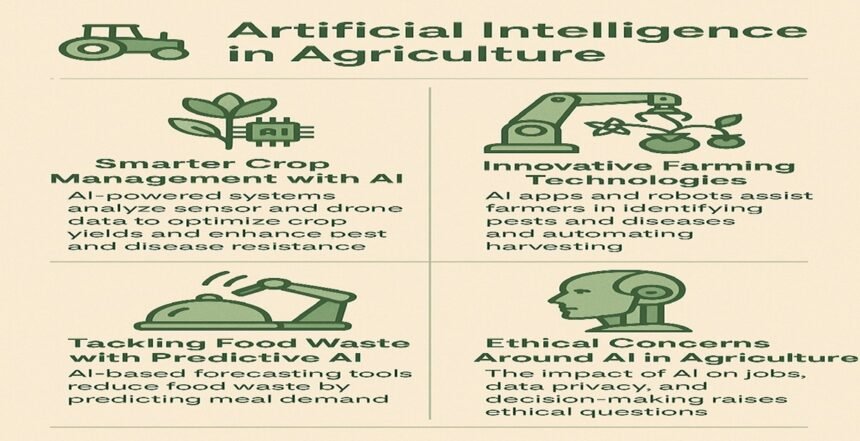Agriculture Revolutionizing through Artificial Intelligence
The agricultural industry is undergoing a major transformation, thanks to the integration of Artificial Intelligence (AI). From improving crop yields to reducing food waste and addressing ethical concerns, AI is revolutionizing how we grow, harvest, and distribute food. Let’s explore the key ways AI is reshaping agriculture across the globe.
Smarter Crop Management with AI
AI-powered systems are enabling precise crop monitoring and management. By analyzing real-time data from sensors and drones, farmers can make informed decisions to boost crop yields, identify diseases early, and strengthen resistance to pests. This results in more productive farms and reduced reliance on chemical treatments.
In drought-prone regions like southern Spain, AI-based irrigation systems are playing a critical role in conserving water and lowering carbon emissions. These smart systems automatically adjust greenhouse conditions, saving millions of liters of water and creating a more sustainable farming environment.
Innovative Farming Technologies Changing Rural Lives
In regions like sub-Saharan Africa, small-scale farmers are benefitting from affordable AI tools. For example, an AI-powered mobile app in Cameroon allows farmers to scan crops, detect pests or diseases instantly, and receive personalized treatment advice — right from their smartphones. This democratizes access to agricultural expertise.
Meanwhile, in Madrid, a two-armed AI-driven harvesting robot is helping reduce labor costs, minimize produce waste, and enhance working conditions for human workers. Robotics and automation are fast becoming essential parts of the modern farming toolkit.
Tackling Food Waste with Predictive AI
Food waste is a growing problem — particularly in the hospitality and food service industries. In Germany, restaurants and canteens are using AI-based forecasting tools to predict daily food demand more accurately. These systems can significantly reduce the 17% of food waste generated by overproduction, helping both the environment and business profitability.
Ethical Concerns Around AI in Agriculture
As AI becomes more embedded in farming, ethical questions are surfacing. From data privacy to job displacement and AI decision-making, stakeholders must address how this technology affects human workers and communities. Thought-provoking conversations — like those involving Ameca, the world’s most advanced humanoid robot — are raising public awareness about the ethical dimensions of AI in agriculture.
Artificial Intelligence is not just a buzzword in agriculture — it’s a powerful tool for sustainable, efficient, and smart farming. Whether it’s saving water in greenhouses, reducing food waste in canteens, or empowering small farmers with instant crop insights, AI is transforming agriculture for the better.
As this technology evolves, balancing innovation with ethics will be key to ensuring that AI supports farmers, consumers, and the planet alike.
Credit the Source:-





